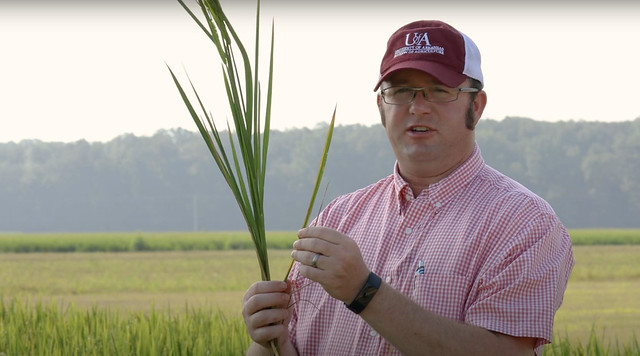April 17, 2020
Research-based video explains importance of potassium for Arkansas row crops
By Fred Miller
U of A System Division of Agriculture
@AgNews479
Fast facts
- Potassium is as critical as nitrogen to most Arkansas crops
- The most limiting nutrient for soybeans
- Link to “Potassium Deficiency in Row Crops” video: https://youtu.be/ywdwj4uiGmw
(609 words)
Download related PHOTOS: https://flic.kr/s/aHsmMDk935
Crop production publications: https://www.uaex.uada.edu/farm-ranch/crops-commercial-horticulture/default.aspx
FAYETTEVILLE, Ark. — Potassium, or potash, is an important nutrient for Arkansas’ major row crops, and a deficiency of it can significantly reduce yields at harvest.

A video, “Potassium Deficiency in Row Crops,” from the University of Arkansas System Division of Agriculture explains the importance of potassium fertilizer to Arkansas crops and how growers can make sure their plants have enough of the nutrient to maximize their yield potentials.
The video can be seen here: https://youtu.be/ywdwj4uiGmw
Potassium aids in water regulation in plants, said Trent Roberts, associate professor of crop, soil and environmental sciences for the Division of Agriculture.
“It’s essential for a lot of the pathways tied to water and water regulation,” Roberts said, “including transpiration, canopy temperature, carbon dioxide capture, and others.”
Nitrogen fertilizer is often the focal point of most row crop systems, and potassium is sometimes neglected. “We know if we don’t put sufficient nitrogen on our crops we can’t expect to maximize the yields,” Roberts said. “But most row crops need as much or more potassium in their above-ground tissue as nitrogen.”
Inadequate potassium nutrition can limit yields, similar to inadequate nitrogen, Roberts said. And for legumes, like soybeans, which absorb nitrogen from the air and convert it into a nutrient through nitrogen fixation, potassium becomes the most important fertilizer nutrient for most legumes to ensure optimum yields.
Roberts said light textured soils, like silt loam and sandy soils, tend to be potassium deficient. “These are the ones where proper potassium management is going to be most crucial,” he said.
Clay soils usually have adequate soil-test potassium for Arkansas crops.
“The first step to detecting and correcting potassium deficiency is soil testing,” Roberts said.
Decades of research by the Arkansas Agricultural Experiment Station, the Division of Agriculture’s research arm, has resulted in calibrated soil test-based data that allows the Soil Testing and Research Laboratory to provide accurate fertilizer recommendations, Roberts said. Soil testing, available from the Division of Agriculture’s Soil Testing Program can help growers know how much potash they need to apply before planting their crops.
“This is the first step to ensuring that potassium will not be limiting and helps get the crop off on the right foot,” Roberts said.
Roberts said farmers should contact their county extension offices to obtain soil testing information, supplies and services.
Growers should follow up during the growing season by scouting their fields to look for signs of potassium deficiency, but beware of “hidden hunger,” Roberts said. Insufficient potassium can cause yield-limiting deficiencies in crops before visible symptoms appear.
Hidden hunger can be avoided by testing tissue samples from crop plants to identify potassium deficiencies during plant growth, Roberts said. These can be submitted for analysis through the county extension offices and will let farmers know if mid-season potash applications are needed.
Often, Roberts said, yields can be recovered if potassium deficiency is detected early in the season and corrected with mid-season potash applications.
In the “Potassium Deficiency in Row Crops” video, Roberts gives more detailed information about the effects and symptoms of deficiency in corn, rice, cotton and soybeans, how to scout for symptoms and ways to avoid or correct it.
The video is available online: https://youtu.be/ywdwj4uiGmw
Roberts said more information on potassium management can be found in Division of Agriculture fact sheets and crop handbooks. These are available for download from the Cooperative Extension Service: https://www.uaex.uada.edu/farm-ranch/crops-commercial-horticulture/default.aspx
Funding support for the video and potassium research was provided by the Arkansas Fertilizer Tonnage Fees, Arkansas Rice Checkoff, Arkansas Soybean Checkoff, and Arkansas Corn and Grain Sorghum Checkoff programs.
A second video focusing on the more complex interactions of potassium in soybeans will be available soon, Roberts said.
To learn more about Division of Agriculture research, visit the Arkansas Agricultural Experiment Station website: https://aaes.uark.edu. Follow us on Twitter at @ArkAgResearch and Instagram at ArkAgResearch.
To learn about extension programs in Arkansas, contact your local Cooperative Extension Service agent or visitwww.uaex.uada.edu. Follow us on Twitter at @AR_Extension.
About the Division of Agriculture
The University of Arkansas System Division of Agriculture’s mission is to strengthen agriculture, communities, and families by connecting trusted research to the adoption of best practices. Through the Agricultural Experiment Station and the Cooperative Extension Service, the Division of Agriculture conducts research and extension work within the nation’s historic land grant education system.
The Division of Agriculture is one of 20 entities within the University of Arkansas System. It has offices in all 75 counties in Arkansas and faculty on five system campuses.
Pursuant to 7 CFR § 15.3, the University of Arkansas System Division of Agriculture offers all its Extension and Research programs and services (including employment) without regard to race, color, sex, national origin, religion, age, disability, marital or veteran status, genetic information, sexual preference, pregnancy or any other legally protected status, and is an equal opportunity institution.
Media Contact: Fred Miller
U of A System Division of Agriculture
Arkansas Agricultural Experiment Station
(479) 575-5647
fmiller@uark.edu
Related Links